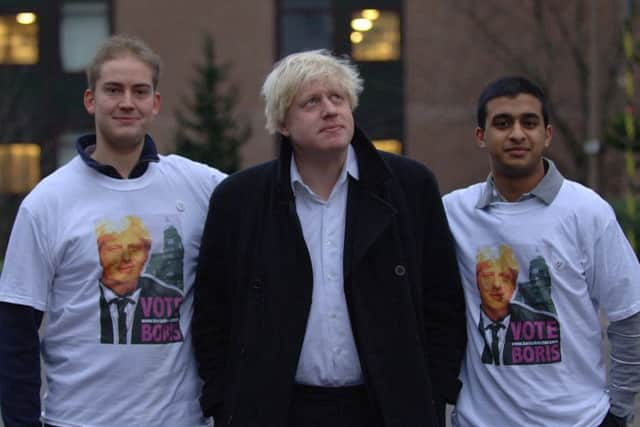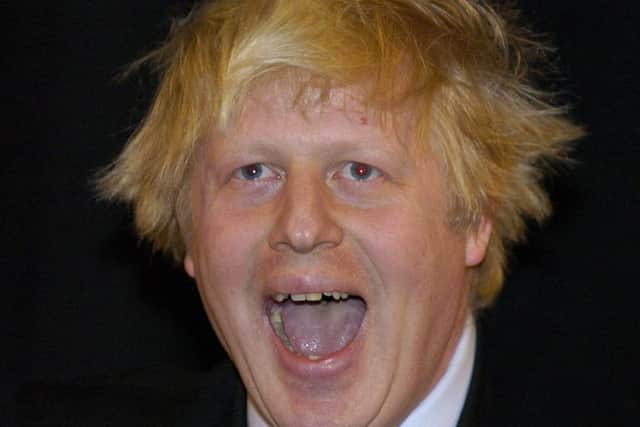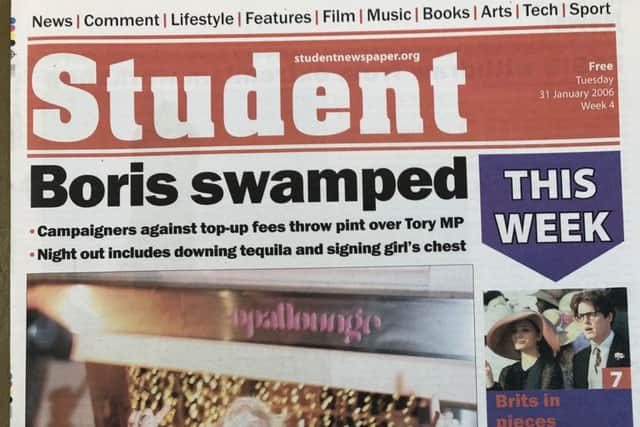Insight: How Boris Johnson was thwarted in a bid to become Edinburgh University rector
Paul Esslemont was standing so close to the shadow minister for higher education he was splashed by the lager being poured over the well-known Tory MP. It was another bizarre incident in what was already a highly unusual political campaign. The room was heaving with party activists, protesters, journalists and the merely curious on a dry Thursday evening in January 2006. The venue was a drab bar in a student hall of residence in Edinburgh. And the politician left wiping Tennent’s from his suit jacket and patting down his generous mop of blond hair was Boris Johnson, the man likely to become the next prime minister of the United Kingdom.
Esslemont was part of a team of students campaigning for Johnson to be elected rector of the University of Edinburgh. The gathering at Pollock Halls, a sprawling residential complex in the southside of the capital, was supposed to be the campaign’s official launch. But like so many events in the life of Boris, things did not go entirely to plan.
Advertisement
Hide AdAdvertisement
Hide AdAround 30 protesters had swarmed the bar, waving placards with slogans like “Bog Off Boris” and “No Boris, No Top Up Fees”. Amidst the raucous atmosphere, a member of the university’s Scottish Socialist society approached the then MP for Henley and asked for a picture. Snap taken, the student promptly up-ended his drink over the senior Conservative.


“He just laughed it off,” Esslemont recalls more than 13 years later. “I was standing next to him and got splashed as well. He took it all in good spirits.”
Contemporary reports confirm this. “I tried to make a speech but I couldn’t hear anything because of the noise,” Johnson, then aged 41, told a reporter from The Scotsman. “At the end, someone very kindly poured a pint of beer over my head. I am most grateful because it was the first of many drinks I received one way or the other over the evening.”
Adam Ramsay, then a second-year student, was one of the protesters in the room. “I think he viewed it as part of the theatre of student politics. It was a fun and bawdy kind of evening.”
It was a classic example of Johnson using humour to put a positive spin on a situation that could easily have infuriated others. To his supporters, it remains one of his qualities. Unlike tongue-tied Theresa May, robotically repeating the same tired lines, Boris is at ease when speaking to people – even if what he says sometimes has the unintended effect of getting him in trouble. To his detractors, it’s a tactic used to bluff his way through events for which he is ill-prepared.


Johnson in 2019 tries hard to present himself as a more serious individual. Much has been written in the London press about his healthier lifestyle and tidier haircut, as if this alone is proof of more statesman-like behaviour. His renewed campaign for the Tory leadership has so far been characterised by the number of times he’s ducked from facing the media, instead of courting them.
Yet the Johnson that caused havoc in Edinburgh over a decade ago is still recognisably the same character. The younger version was content to be dubbed a maverick and would never have ignored a reporter’s question. But the iron-plated self-confidence and relentless ambition were still very much on show.
When his rectorial candidacy was announced in early 2006, his opponents faced a question that has since occupied the minds of numerous senior politicians – just how do you stop a man like Boris?
Advertisement
Hide AdAdvertisement
Hide AdStudents elect a new rector every three years in a tradition unique to Scotland’s ancient universities. There have been numerous high-profile candidates for the Edinburgh position – in 1935 students invited Leon Trotsky to stand, only for the revolutionary to politely decline as he would not be allowed to campaign under the Bolshevik banner.


Many wondered why Johnson, who already enjoyed a high media profile at the time thanks to regular TV appearances, would bother taking part in such an archaic election. As a man with a quotation for all occasions, he must surely have been aware of the famous observation by the American academic Wallace Stanley Sayre: “University politics are so intense because the stakes are so low”.
Timing was one aspect. The month before his candidacy was revealed Johnson was given the job of shadow minister for higher education by the newly installed Tory leader David Cameron. Boris, as ever, was keen to stand out in his new role.
Then came the invitation from Edinburgh University’s Conservative association. It was the kind of challenge he could not turn down.
“There were various names discussed, but someone had a contact with Boris and we thought - he’s famous, people like him, he’ll do well,” recalls Esslemont, who was association treasurer at the time. “He was a big name - even back then - so we were surprised he was quite so keen to go forward with it. But we were glad that he did. We were excited to get him up to Edinburgh.”
Team Boris attracted support from non-Tories as well. Jordan Dias, then a third year student, took on the position of campaign spokesman despite not being a party member. Now working in London as a management consultant, he told Scotland on Sunday he wanted a more exciting candidate for rector.
The previous incumbent had been veteran Labour MP Tam Dalyell, widely respected within the university administration, but described by Dias as “nondescript”. He joined the Boris campaign after a pal asked if he would help out. “Back in the days when your friends were allowed to have different political views,” Dias jokes.
“Back then Boris was, at the risk of quoting someone else, much more kind, gentler. He was a personality and the role was crying out for someone with personality.”
Advertisement
Hide AdAdvertisement
Hide AdThe man himself insisted his intentions were serious. “It’s no joke being rector,” Johnson told the Guardian, an indication of the national media attention his rectorial candidacy was beginning to attract. “It’s a serious business representing the students and staff at the highest level. It will be hard work and I’m up for that.
“I enjoyed my time as a student immensely, but it’s obvious that 20 years on university life has changed. I want to learn all about the problems students and university staff face today and what steps must be taken by government and universities to improve the situation.”
The impending Boris roadshow was viewed with open-mouthed horror by members of the university’s more left-leaning societies.
“He was more like a comedian than a politician,” recalls Ramsay, who would help lead a rival campaign to elect Green MSP Mark Ballard. “I suppose I was quite worried when it was announced.
“I remember journalists, not on campus, declared that he was the favourite. We thought: is he really?
“We felt better equipped to mount a more effective campaign than he could. I was reasonably confident we could beat him.”
The arrival of Johnson, and the media attention he brought with him, inspired his rivals to step up their campaigns.
“It raised the profile of the whole event significantly,” agrees Ramsay, who is now co-editor of the Open Democracy website. “It meant more people got involved, for and against him. It became a much bigger event than previous rectorial elections.”
Advertisement
Hide AdAdvertisement
Hide AdThe Greens soon settled on a campaign strategy. “We had to make clear that being rector was a serious job,” Ramsay explains. “If people thought it was a ceremonial role, they could give it to a celebrity.
“But if they understood the rector was the chair of the board of governors, and that the board makes decisions on things like the level of rent in student accommodation, then they would take the vote more seriously.”
Controversially, the Edinburgh University Students’ Association (EUSA) also decided to take a firm stand against Boris. Traditionally, the representative body remained neutral when it came to student elections.
Soon EUSA-branded leaflets, with a variety of anti-Boris slogans, were being distributed around campus. One explained: “We are actively campaigning against Boris Johnson because of his support for top-up fees, commercial interest rates on student loans and his refusal to rule out raising the £3,000 cap (on student fees)”.
Ruth Dawkins was EUSA president at the time. Now living in Tasmania, she says it’s important to explain the context of EUSA’s opposition. Tuition fees was, and continues to be, the dominant issue for those involved in student representation.
The policy was introduced across the UK in 1998 by the New Labour government, but the devolved administrations in Scotland, Wales and Northern Ireland chose to implement them in different ways. For a university like Edinburgh, attracting as it does undergraduates from all corners of the UK, it meant the issue of who paid what was a familiar topic of conversation on campus.
Tuition fee caps were increased in 2004 for students from England and there was widespread belief they would soon rise again.
“We were campaigning against fees in general,” Dawkins explains. “As president I sat on the university court and got a feeling for what the role of rector meant. Having a rector in place whose views would be in direct opposition to the things we were campaigning against would have been very challenging.
Advertisement
Hide AdAdvertisement
Hide Ad“He (Johnson) wasn’t just an MP. He was a shadow minister and had spoken out in favour of commercial interest on student loans.
“There was also the fact the university was doing a lot, at that time, to try and widen access. We were going out and speaking to school children and trying to tell them that university was not just for rich people or for the privately educated. To then have a very public figurehead for the university who was rich, privately educated and Conservative would have undone so much of that good work.”
The pro-Boris campaign was more straightforward. They would seek to capitalise on their candidate’s star power by taking him on a tour of popular student boozers.
Andy Milne, a reporter from Student, the university newspaper, accompanied that big night out in 2006. He reported that over the course of the evening, Johnson “acquired two pints of bitter, a pint of Guinness, a gin and tonic, a whisky, two shots of tequila and an Aftershock from adoring fans”.
He continued: “Mr Johnson was mobbed by over 600 students on the evening, one of whom even invited the shadow higher education secretary to sign her bare chest, a request that Mr Johnson dutifully obliged.”
The Tory candidate certainly seemed to enjoy himself. “I’m absolutely overwhelmed at the warmth and generosity that people have shown. it’s like being Mick Jagger,” he told the paper.
Johnson’s other main campaign event was a hustings held in the Teviot Union. Among the other candidates he shared a stage with were Ballard and journalist Magnus Linklater. In the face of hostile questioning from students, Boris stood his ground: “I’m a passionate believer in higher education but we cannot continue to rely, ad infinitum, on the taxpayer alone for higher education.”
The fees issue would not die down. When students voted in February, Johnson finished a disappointing third place behind Linklater and the triumphant Ballard.
Advertisement
Hide AdAdvertisement
Hide Ad“We lost a hard campaign,” recalls Dias. “But Boris was well received – it was long before his more recent contentious points, and obviously well before Brexit. I think it would be unpalatable to even propose him to stand now.”
Esslemont has fond memories of the campaign but when asked if he would vote for Boris in 2019, he pauses. “I’m not a Conservative member, but he’s not my preferred candidate. He has certainly harboured ambitions to become prime minister, that was evident even back when we tried to make him rector.
“Everyone knew he was quite ambitious. It’s only natural he put his name forward. Out of all the leadership candidates, I’d have probably backed Rory Stewart.”